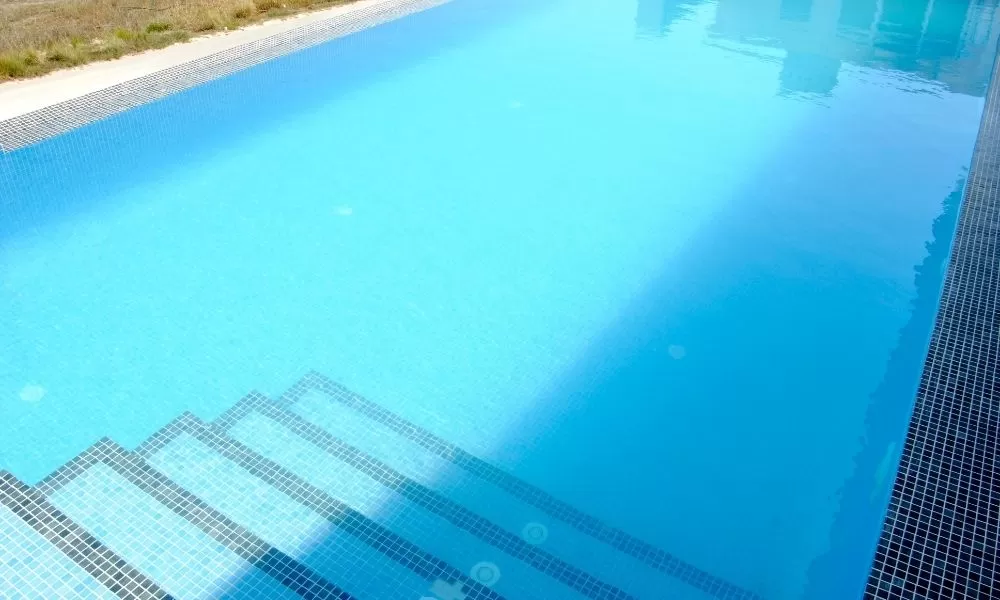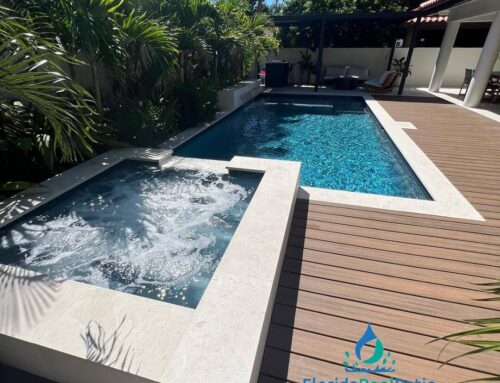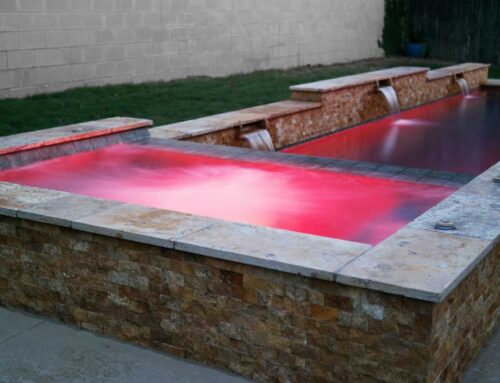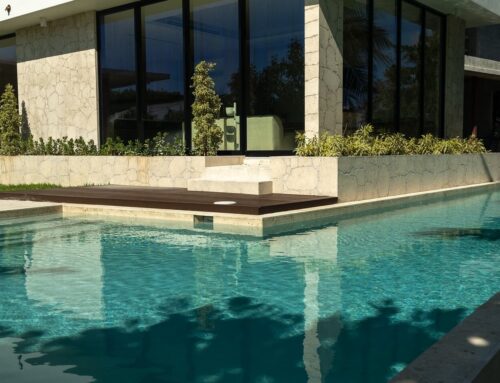Why is my pool cloudy? Cloudy water in a pool is a common issue that can arise due to various reasons, such as an imbalance in chemicals, inadequate filtering, excessive debris, or environmental factors. In this article, we will delve into some of the most typical causes of cloudy water in pools and provide useful tips on how to restore the pool’s water to its former crystal-clear state.
What Is Cloudy Pool Water?
Cloudy water is characterized by its milky or murky appearance, which is caused by a high number of tiny particles that reflect sunlight. These particles can range in size from 0.5 to 5.0 microns, which makes them almost invisible to the naked eye.
The pool water can be cloudy in different degrees:
Dull – Your pool begins to lose its luster and sparkle but you are hardly able to notice the change.
Hazy – You can still make out the details of the swimming pools but the bottom is difficult to see.
Cloudy – Your pool water appears milky, and you have difficulty seeing the bottom at the deepest part of the pool.
Opaque – You won’t see the bottom of the swimming pool.
What Causes a Cloudy Pool?
There are several reasons why your pool water may be cloudy.
1. Poor Filtration
If your pool water is cloudy, it may also be dirty due to stagnation. In fact, around 90% of cloudy pools are caused by inadequate filtration, which can result from a clogged or failing filter, a malfunctioning pump, or insufficient circulation time.
2. The Chlorine or PH Levels Are Incorrect
The second most common reason for a dirty water filter is an improper pH or chlorine level. An imbalance in pH levels can reduce the effectiveness of chlorine and cause its levels to decrease. When there is insufficient free chlorine, a cloudy appearance can result from a combination of chlorine and chloramine. To maintain good water quality, it is recommended that the combined chlorine level remains below 0.5 ppm or just under 0 ppm.
If the pH level of the water exceeds 7.8, the chlorine will be less effective at killing bacteria. This can further impact the water quality and increase the risk of algae growth.
3. Total Alkalinity Too High
Cloudiness in pool water is often linked to a high level of total alkalinity (TA), which can cause an imbalanced pH level and lead to calcium scale formation. If your TA level exceeds 200 ppm, your pool is at risk of becoming cloudy. Additionally, the effectiveness of your chlorine may be reduced, just as it is with an imbalanced pH level.
4. Calcium Hardness Is Too High
Calcium Hardness (CH) refers to the total amount of calcium in water. When calcium levels are too high in water, they can become unstable and be affected by imbalances in pH or TA levels. The ideal range for CH depends on the water temperature and typically falls between 100-400 ppm. If CH exceeds 400 ppm, cloudiness and calcium scaling can occur.
5. Excess Particles From Swimmers
Cloudy water in a pool can result from an accumulation of excess particles due to swimming. The most common particles found in swimming pools are sunscreens and oils, along with body oils, makeup, and perspiration. These particles can reflect light, giving the pool a cloudy appearance.
6. Environmental Debris
Environmental debris such as leaves and twigs can impact the water quality of your pool, particularly when circulation is suboptimal. Pollen, dust, and bird droppings can also affect the appearance of your pool and accumulate in the filter.
7. Rainwater
If you’ve recently had a storm, it’s possible that this may be the cause of your cloudy pool water. Rainwater can deposit nitrates and phosphates in your pool, and heavy rainfall can reduce the effectiveness of your chlorine.
How to Clear Cloudy Swimming Pools
Cloudy swimming pool water can have several causes, but the remedy is usually straightforward. To begin clearing up the cloudiness, you should thoroughly clean your pool and remove any foreign particles or algae. This involves vacuuming and scrubbing all surfaces. If you notice any remaining algae, you can use shock treatment to eliminate it.
Additionally, it’s important to learn about the factors that determine the amount of maintenance your pool requires.
Mechanical Causes
If you’re experiencing cloudy water in your pool, it’s important to first check for any mechanical issues that may be causing it. Make sure you have a filter that’s appropriate for your pool’s size and location, and check that all parts of the pump and filter are functioning properly.
Regular maintenance is crucial for keeping your pool clear and preventing cloudiness. This includes cleaning and vacuuming the pool, as well as checking that all mechanical components are in good working order. To prevent cloudy water, it’s important to run your filtration system for an adequate amount of time.
If you use your pool regularly, running the filtration system 24/7 is recommended. However, if you have a residential pool that’s not frequently used, it should still be run for at least 8-10 hours per day.
Chemical Imbalances
There are various solutions to correct the problems mentioned above, depending on the cause of the cloudy pool water. To start, it is essential to test the chlorine level daily and adjust it accordingly, particularly during the summer when pool usage is high.
If the pH level is too low, you can use a pH increaser (pH plus), and a pH reducer can be used if the pH is too high. A pH reducer can also be used to lower high TA levels, although it may be necessary to repeat the process several times to reach acceptable levels.
If the calcium hardness (CH) level is causing cloudiness, you can reduce the amount of calcium-based chlorine used to maintain the pool. Additionally, setting agents can help reduce the amount of calcium in the pool.
Can You Swim in a Cloudy Pool?
Cloudy pool water is not only unappealing but can also be hazardous for swimming due to several reasons.
- Cloudy water indicates that the chlorine is not functioning correctly, which means there will be a higher presence of bacteria, organisms, and pathogenic bacteria like E. coli. Swimming in cloudy water can cause eye and skin irritations, gastrointestinal issues, and urinary infections.
- A high level of chloramine indicates that there are other contaminants in the pool, such as blood, urine, feces, and sweat.
- Swimming in a cloudy pool can reduce visibility, making it difficult to see the bottom. This can increase the risk of drowning, and also make it more difficult for lifeguards or supervisors to monitor swimmers who may be in distress.
How Can I Prevent Cloudy Pool Water?
Regular maintenance is the best way to prevent cloudy water in your pool. It is important to clean your pool regularly and ensure that your chlorine and TA levels are correct. This will make your water more stable and resistant to pH fluctuations.
Using high-quality products for your pool can also prevent cloudy water. Discount brands often contain less chlorine, which means you will need to use more to reach the desired level. Investing in quality products can save you money and time in the long run.
If you are unsure about chemical imbalances in your pool or which products to use, it’s a good idea to hire a professional pool maintenance team. They can help you maintain a healthy and clear pool that you can enjoy with your family.
Need Professional Pool Services in South Florida?
If you want to enjoy your backyard oasis to the fullest, Florida Pool Patio is the solution you’ve been looking for. Our team of experts provides top-quality pool and patio installation and maintenance services that will transform your backyard into a stunning and comfortable space.
With our affordable prices, you can finally have the outdoor living space of your dreams without breaking the bank. Choose Florida Pool Patio for the ultimate backyard experience.
Contact us today to schedule a consultation and see how we can help bring your backyard vision to life!
Services We Offer:






